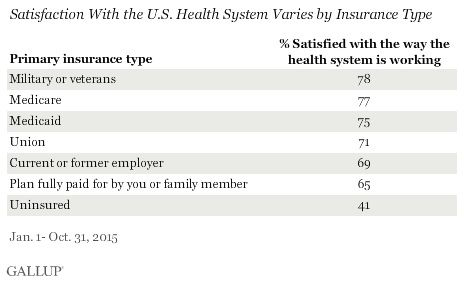- Center on Health Equity & Access
- Clinical
- Health Care Cost
- Health Care Delivery
- Insurance
- Policy
- Technology
- Value-Based Care
People With ACA Plans Least Satisfied With Health System Among Insured Individuals
Americans with veterans or military health, Medicare, and Medicaid have a higher satisfaction with the way the healthcare system works for them. People on plans purchased through the Affordable Care Act exchanges are the least satisfied of insured groups.
Americans with veterans or military health, Medicare, and Medicaid have a higher satisfaction with the way the healthcare system works for them. Satisfaction is lower among those with employer-sponsored and self-paid insurance, according to the results of a Gallup survey.
Overall, 67% of Americans are satisfied with the US health system in 2015, which is up slightly from 66% in November 2014. Gallup only started tracking satisfaction after the end of the first open enrollment period under the Affordable Care Act.

How much they have to contribute to the cost of their healthcare is a large factor of how satisfied Americans are with the health system, which explains why individuals whose plans are subsidized by the government are more satisfied.
Those people with health insurance purchased through the Affordable Care Act’s exchanges are the least satisfied among people with insurance. According to Gallup, this may be a result of higher deductibles and co-pays for the silver-level ACA plans compared with employer-sponsored plans.
Some reasons why Americans who get their health insurance through government-sponsored or assisted plans might be more satisfied with the healthcare system may be that government plans are more inclusive and have lower direct costs. The scope of the Gallup survey only asked about healthcare generally.
However, it is notable that satisfaction among all insured groups is at least 65% or more. Only in the group of uninsured does the rate of satisfaction dip below half (41%).
“Therefore, other aspects of the government plans such as access to more specialists, the availability of different services or ease of scheduling appointments may also factor into the higher satisfaction levels,” Rebecca Riffkin concluded in a Gallup article on the study results.
The Gallup survey was conducted from January 1 to October 31, 2015, and included a random sample of more than 147,000 adults, age 18 years and older.
